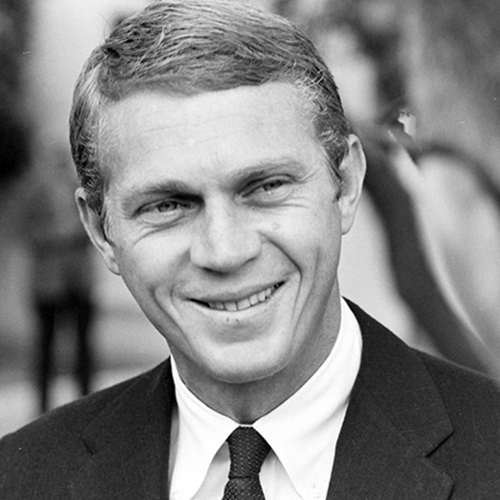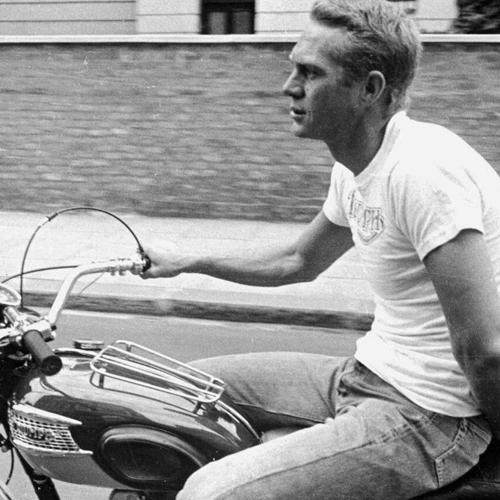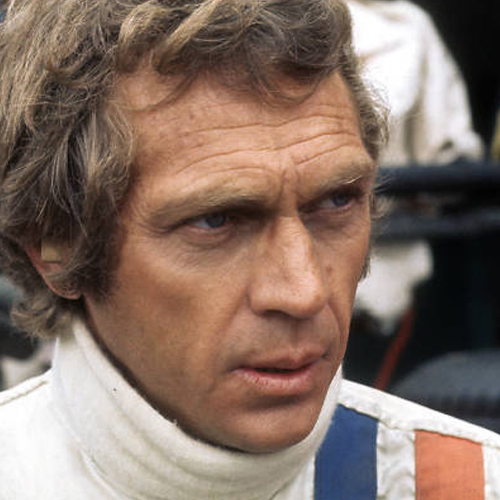
Steve McQueen
Born: 24 March 1930
Died: 7 November 1980 (50 Years)
Cause: On November 7, 1980, McQueen died of a heart attack at 3:45 a.m. at a Juárez hospital, 12 hours after surgery to remove or reduce numerous metastatic tumors in his neck and abdomen. He was 50 years old. According to the El Paso Times, McQueen died in his sleep.
Died: 7 November 1980 (50 Years)
Cause: On November 7, 1980, McQueen died of a heart attack at 3:45 a.m. at a Juárez hospital, 12 hours after surgery to remove or reduce numerous metastatic tumors in his neck and abdomen. He was 50 years old. According to the El Paso Times, McQueen died in his sleep.

Steve McQueen

Steve McQueen
Terrence Stephen McQueen (March 24, 1930 – November 7, 1980) was an American actor. His antihero persona, emphasized during the height of the counterculture of the 1960s, made him a top box-office draw for his films of the late 1950s, 1960s, and 1970s. He was nicknamed the "King of Cool" and used the alias Harvey Mushman in motor races.
McQueen received an Academy Award nomination for his role in The Sand Pebbles (1966). His other popular films include Love with the Proper Stranger (1963), The Cincinnati Kid (1965), Nevada Smith (1966), The Thomas Crown Affair (1968), Bullitt (1968), Le Mans (1971), The Getaway (1972), and Papillon (1973). In addition, he starred in the all-star ensemble films The Magnificent Seven (1960), The Great Escape (1963), and The Towering Inferno (1974).
In 1974, McQueen became the highest-paid movie star in the world, although he did not act in film for another four years. He was combative with directors and producers, but his popularity placed him in high demand and enabled him to command the largest salaries.
McQueen followed a daily two-hour exercise regimen, involving weightlifting and, at one point, running 5 miles (8 km), seven days a week. McQueen learned the martial art Tang Soo Do from ninth-degree black belt Pat E. Johnson.
According to photographer William Claxton, McQueen smoked marijuana almost every day; biographer Marc Eliot stated that McQueen used a large amount of cocaine in the early 1970s. He was also a heavy cigarette smoker. McQueen sometimes drank to excess; he was arrested for driving while intoxicated in Anchorage, Alaska, in 1972.
McQueen developed a persistent cough in 1978. He gave up cigarettes and underwent antibiotic treatments without improvement. His shortness of breath grew more pronounced, and on December 22, 1979, after filming The Hunter, a biopsy revealed pleural mesothelioma, a cancer associated with asbestos exposure for which there is no known cure.
A few months later, McQueen gave a medical interview in which he blamed his condition on asbestos exposure. McQueen believed that asbestos used in movie sound stage insulation and race-drivers protective suits and helmets could have been involved but he thought it more likely that his illness was a direct result of massive exposure while removing asbestos lagging (insulation) from pipes aboard a troop ship while he served in the Marines.
By February 1980, evidence of widespread metastasis was found. He tried to keep the condition a secret but on March 11, 1980, the National Enquirer disclosed that he had "terminal cancer". In July 1980, McQueen traveled to Rosarito Beach, Mexico, for unconventional treatment after U.S. doctors told him they could do nothing to prolong his life. Controversy arose over the trip because McQueen sought treatment from William Donald Kelley, who was promoting a variation of the Gerson therapy that used coffee enemas, frequent washing with shampoos, daily injections of fluid containing live cells from cattle and sheep, massages, and laetrile, a reputed anti-cancer drug available in Mexico, but long known to be both toxic and ineffective at treating cancer. McQueen paid for Kelley's treatments by himself in cash payments which were said to have been upwards of $40,000 per month ($132,000 today) during his three-month stay in Mexico. Kelley's dental license, his only medically related license (until revoked in 1976) had been for orthodontics, a field of dentistry, not medicine. Kelley's methods caused a sensation in the traditional and tabloid press when it became known that McQueen was a patient.
McQueen returned to the U.S. in early October. Despite metastasis of the cancer throughout McQueen's body, Kelley publicly announced that McQueen would be completely cured and return to normal life. McQueen's condition soon worsened and huge tumors developed in his abdomen.
In late October 1980, McQueen flew to Ciudad Juárez, Chihuahua, Mexico to have an abdominal tumor on his liver (weighing around five pounds (2.3 kg)) removed, despite warnings from his U.S. doctors that the tumor was inoperable and his heart could not withstand the surgery. Using the name, "Samuel Sheppard," McQueen checked into a small Juárez clinic where the doctors and staff were unaware of his actual identity.
On November 7, 1980, McQueen died of a heart attack at 3:45 a.m. at a Juárez hospital, 12 hours after surgery to remove or reduce numerous metastatic tumors in his neck and abdomen. He was 50 years old. According to the El Paso Times, McQueen died in his sleep.
Leonard DeWitt of the Ventura Missionary Church presided over McQueen's memorial service.McQueen was cremated, and his ashes were spread in the Pacific Ocean.
In 2007, Forbes said McQueen remained a popular star and still the "king of cool", even 27 years after his death, and was one of the highest-earning dead celebrities. A rights-management agency head credited Branded Entertainment Network (called Corbis at the time) with maximizing the profitability of his estate by limiting the licensing of McQueen's image, avoiding the commercial saturation of other dead celebrities' estates. As of 2007, McQueen's estate entered the top 10 of highest-earning dead celebrities.
(wikipedia)
McQueen received an Academy Award nomination for his role in The Sand Pebbles (1966). His other popular films include Love with the Proper Stranger (1963), The Cincinnati Kid (1965), Nevada Smith (1966), The Thomas Crown Affair (1968), Bullitt (1968), Le Mans (1971), The Getaway (1972), and Papillon (1973). In addition, he starred in the all-star ensemble films The Magnificent Seven (1960), The Great Escape (1963), and The Towering Inferno (1974).
In 1974, McQueen became the highest-paid movie star in the world, although he did not act in film for another four years. He was combative with directors and producers, but his popularity placed him in high demand and enabled him to command the largest salaries.
McQueen followed a daily two-hour exercise regimen, involving weightlifting and, at one point, running 5 miles (8 km), seven days a week. McQueen learned the martial art Tang Soo Do from ninth-degree black belt Pat E. Johnson.
According to photographer William Claxton, McQueen smoked marijuana almost every day; biographer Marc Eliot stated that McQueen used a large amount of cocaine in the early 1970s. He was also a heavy cigarette smoker. McQueen sometimes drank to excess; he was arrested for driving while intoxicated in Anchorage, Alaska, in 1972.
McQueen developed a persistent cough in 1978. He gave up cigarettes and underwent antibiotic treatments without improvement. His shortness of breath grew more pronounced, and on December 22, 1979, after filming The Hunter, a biopsy revealed pleural mesothelioma, a cancer associated with asbestos exposure for which there is no known cure.
A few months later, McQueen gave a medical interview in which he blamed his condition on asbestos exposure. McQueen believed that asbestos used in movie sound stage insulation and race-drivers protective suits and helmets could have been involved but he thought it more likely that his illness was a direct result of massive exposure while removing asbestos lagging (insulation) from pipes aboard a troop ship while he served in the Marines.
By February 1980, evidence of widespread metastasis was found. He tried to keep the condition a secret but on March 11, 1980, the National Enquirer disclosed that he had "terminal cancer". In July 1980, McQueen traveled to Rosarito Beach, Mexico, for unconventional treatment after U.S. doctors told him they could do nothing to prolong his life. Controversy arose over the trip because McQueen sought treatment from William Donald Kelley, who was promoting a variation of the Gerson therapy that used coffee enemas, frequent washing with shampoos, daily injections of fluid containing live cells from cattle and sheep, massages, and laetrile, a reputed anti-cancer drug available in Mexico, but long known to be both toxic and ineffective at treating cancer. McQueen paid for Kelley's treatments by himself in cash payments which were said to have been upwards of $40,000 per month ($132,000 today) during his three-month stay in Mexico. Kelley's dental license, his only medically related license (until revoked in 1976) had been for orthodontics, a field of dentistry, not medicine. Kelley's methods caused a sensation in the traditional and tabloid press when it became known that McQueen was a patient.
McQueen returned to the U.S. in early October. Despite metastasis of the cancer throughout McQueen's body, Kelley publicly announced that McQueen would be completely cured and return to normal life. McQueen's condition soon worsened and huge tumors developed in his abdomen.
In late October 1980, McQueen flew to Ciudad Juárez, Chihuahua, Mexico to have an abdominal tumor on his liver (weighing around five pounds (2.3 kg)) removed, despite warnings from his U.S. doctors that the tumor was inoperable and his heart could not withstand the surgery. Using the name, "Samuel Sheppard," McQueen checked into a small Juárez clinic where the doctors and staff were unaware of his actual identity.
On November 7, 1980, McQueen died of a heart attack at 3:45 a.m. at a Juárez hospital, 12 hours after surgery to remove or reduce numerous metastatic tumors in his neck and abdomen. He was 50 years old. According to the El Paso Times, McQueen died in his sleep.
Leonard DeWitt of the Ventura Missionary Church presided over McQueen's memorial service.McQueen was cremated, and his ashes were spread in the Pacific Ocean.
In 2007, Forbes said McQueen remained a popular star and still the "king of cool", even 27 years after his death, and was one of the highest-earning dead celebrities. A rights-management agency head credited Branded Entertainment Network (called Corbis at the time) with maximizing the profitability of his estate by limiting the licensing of McQueen's image, avoiding the commercial saturation of other dead celebrities' estates. As of 2007, McQueen's estate entered the top 10 of highest-earning dead celebrities.
(wikipedia)

